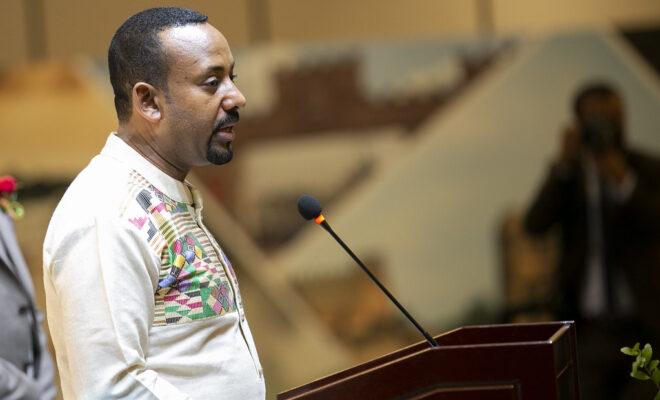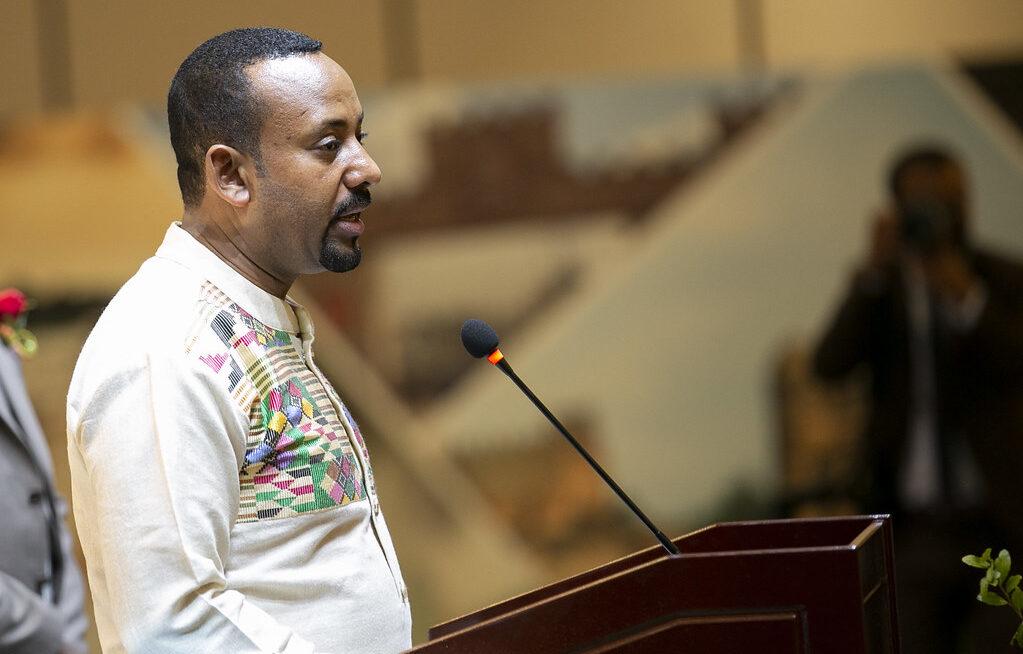What could happen next in Ethiopia’s war of attrition?

While Abiy may control the plains, the TPLF are almost impossible to defeat in the mountains. The one factor that could change things is external.

Prime Minister Abiy Ahmed of Ethiopia giving a speech in 2019. Credit: Paul Kagame.
All wars end. It is just a question of how long it takes and how many people die in the process.
Ethiopia is turning into Africa’s forgotten war, partly because so little reliable information is available, with the authorities reluctant to allow independent reporting and propaganda rife on all sides, partly because efforts to resolve it seem to be getting nowhere with the international community held at arms’ length. Unless, of course, they are coming to sell arms or deliver support. And that is part of the problem.
Though Africa’s oldest independent state, Ethiopia has a long history of civil wars. There has been a perpetually shifting balance between the different peoples and “nations” that make up the country, and between the central authority (whoever has held it) and the regions. Several of these past wars have been bloody affairs, involving massacres of combatants and civilians alike.
Ethiopia is scarcely unique in this: most countries that now consider themselves stable have had their fair share of vicious domestic conflicts. It is true of Britain, Germany, France, the US, and even China where the Communist victory in 1949 emerged not only from a period of foreign occupation but from the era of warlords in the 1920s and 1930s when central control largely disintegrated. Many African nations far younger than Ethiopia face similar tensions and struggle hard to find an acceptable balance between the regions, interests and factions within their borders.
In Ethiopia, military dominance has always been crucial to effective central control. This has not changed. Haile Selassie’s reign was based on the military victory of Segale in 1916 against his deposed predecessor. The Derg’s rule was based on their control of the army, until overthrown by the Ethiopian People’s Revolutionary Democratic Front (EPRDF) in 1991. But military control alone is never sufficient. The state still needs to be seen as legitimate in the eyes of the people being ruled, or at least a sufficient majority of them.
Prime Minister Abiy Ahmed and the Tigrayan People’s Liberation Front (TPLF) leadership both miscalculated from the outset, over-estimating their own political and military strength and under-estimating that of their opponent. It is this mutual miscalculation that runs the risk, if prolonged, of leading to a stalemate that will see Ethiopia join South Sudan, Libya and the Yemen in interminable conflict, devastating to the economy and the people.
It is already becoming a war of attrition. PM Abiy may believe this works to his advantage: with only 6 million Tigrayans and over 90 million people in the rest of the country, ultimate victory may seem inevitable. But this too may prove a miscalculation if the cost of the war undermines his own legitimacy and puts his authority at risk. This may be one reason the government are so relentlessly, and recklessly, stirring up the rhetoric of ethnic mistrust and hatred in order to bolster his political position by increasing fear of the Tigrayans. Elsewhere such rhetoric has been a precursor to genocide.
Both sides already see the conflict as existential. Abiy fears being evicted from power, the Amhara fear once again being excluded from it, as they were after the fall of Haile Selassie, and the Tigrayans fear effective annihilation and exile, as appeared to be happening before they recovered military control of Tigray. In these circumstances, neither side wants to cede the least advantage through negotiation and sees military victory as the only route to survival. So both will fight to the bitter end, which could still be many years away. While Abiy may control the plains, the Tigrayans are almost impossible to defeat in the mountains, and are seeking to build alliances with those dissatisfied with Abiy in other regions, including Oromia – a number that will surely grow as economic conditions deteriorate. As Alex Rondos recently pointed out in The World Today, the cost of continued conflict in Ethiopia for the wider Horn as a whole would be disastrous.
The one factor that can change this situation is external. The international community has both influence and agency which it could use to increase pressure for a peaceful settlement. But for now it seems divided, and this itself could prolong rather than shorten Ethiopia’s agony.
Given the divisions within the regional bloc IGAD between Ethiopia, Eritrea and Somalia (or at least its federal government) on one side and the rest on the other, and Abiy’s deep-seated hostility to the UN, the body with political legitimacy to act is the African Union. In appointing former Nigerian president Olusegun Obasanjo as their envoy, they have an elder statesman of weight and experience, but currently lacking an office that can take forward detailed analysis and continuous engagement. President Kenyatta of Kenya has also been active in trying to broker talks, and the two together represent the best chance of persuading both sides to talk rather than fight.
Institutionally, the AU tends to have an “incumbency bias”. Many of its members face secessionist movements or groups that seek their violent overthrow and there is therefore a default tendency to support the incumbent government. But Addis Ababa is not a comfortable seat for it in a country riven by civil war, and many members are conscious of the high cost to the region and the continent of continued instability there. With encouragement, they could exert significant pressure for a negotiated solution.
Several other international players, however, seem less keen to support these efforts, and more interested in helping Abiy’s government achieve military victory. The spectre of Syria looms – where unscrupulous foreign powers supported a corrupt and vicious regime that massacred its own people into submission, primarily in order to create a client state for their own geo-strategic advantage. For both powers, “defeating the West” was an additional motive.
There are reports that both Turkey and the UAE are helping arm Ethiopian government forces, and the recent visit to Addis Ababa of China’s Foreign Minister Wang Yi sent an explicit message of political support to Prime Minister Abiy. The motives of each may vary: China has large economic interests that are being damaged by the war, but sees Ethiopia as an important ally in their rivalry with the US. Turkey wants to expand its arms sales (though where Abiy will find the money to pay for the arms is another matter), and sees Ethiopia as an ally against Egypt. For the UAE, a weakened but pliant Ethiopia would strengthen their own growing presence in Red Sea countries.
The problem for all three, however, is that if the war continues and becomes ever more vicious, they may be implicated in supporting actions which will not stand scrutiny in the court of international public opinion. Russia bore that cost in Syria because it was geo-strategically crucial. But is Ethiopia that valuable to its government’s backers?
The US and European Union (EU) have taken tougher positions on both parties to the conflict, though some EU member states are reluctant to impose US-style sanctions on the grounds that it would diminish their influence with the Ethiopian government. All are at least firmly behind the AU peace efforts.
But these will have little traction until both sides see no chance of a military solution, and a united message from the international community that the fighting must stop. No solution can be imposed on the Ethiopians – that they must find. But now is not the time to add fuel to their fire. So the road to peace in Ethiopia runs through Beijing, Ankara and Abu Dhabi as much as through New York and the AU. And until that road is run, the fighting will continue, the Ethiopian people will suffer, and the region will become increasingly unstable.
Is the Horn, like Syria or the Yemen, to be another victim of the new multipolar world? The origins of conflict may be in Ethiopia’s own divisions, but its resolution now depends on international action.





